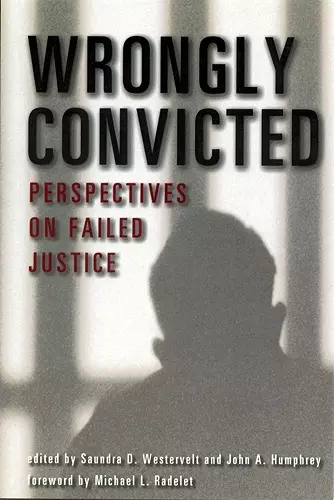Wrongly Convicted
Perspectives on Failed Justice
John A Humphrey editor Saundra D Westervelt editor
Format:Paperback
Publisher:Rutgers University Press
Published:1st Jun '01
Currently unavailable, and unfortunately no date known when it will be back

The American criminal justice system contains numerous safeguards to prevent the conviction of innocent persons. The Bill of Rights provides nineteen separate rights for the alleged criminal offender, including the right to effective legal representation and the right to be judged without regard to race or creed. Despite these safeguards, wrongful convictions persist, and the issue has reverberated in the national debate over capital punishment.
The essays in this volume are written from a cross-disciplinary perspective by some of the most eminent lawyers, criminologists, and social scientists in the field today. The articles are divided into four sections: the causes of wrongful convictions, the social characteristics of the wrongly convicted, case studies and personal histories, and suggestions for changes in the criminal justice system to prevent wrongful convictions. Contributors examine a broad range of issues, including the fallibility of eyewitness testimony, particularly in cross-racial identifications; the disadvantages faced by racial and ethnic minorities in the criminal justice system; and the impact of new technologies, especially DNA evidence, in freeing the innocent and bringing the guilty to justice. The book also asks such questions as: What legal characteristics do wrongful convictions share? What are the mechanisms that defendants and their attorneys use to overturn wrongful convictions? The book also provides case studies that offer specific examples of what can and does go wrong in the criminal justice system.
The contributors to this collection discuss the many ways in which innocent criminal defendants can be convicted in a system that places great emphasis on protecting them. Some involve culpability: brutal or racially biased police and other officials, treacherous informants, and incompetent attorneys. . . . Recommended for upper-division undergraduates, graduate students, and faculty. (Choice) An all-star set of contributors and clearly written essays make this a worthwhile addition to anti-death penalty literatures. Westervelt and Humphrey take a practical approach to the topic. Essays in Part 1 show that eyewitnesses are often wrong, police trick suspects into making confessions, informants lie to gain benefits, and police can be incompetent or venal. Part 2 argues that those who are unpopular, uneducated, or members of a racial minority invite harsher treatment by authorities. The next section offers case studies on convictions that were wrongly obtained. . . . This excellent introduction to a controversial topic is highly recommended. (Library Journal) A very powerful addition to the debate on capital punishment. - George Kelling (author of Fixing Broken Windows)
ISBN: 9780813529523
Dimensions: 229mm x 152mm x 20mm
Weight: 510g
301 pages